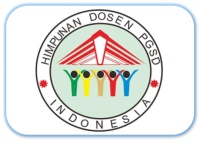PENERAPAN PENDEKATAN PROBLEM SOLVING UNTUK MENINGKATKAN HASIL BELAJAR SISWA PADA PEMBELAJARAN IPA
Abstract
This study originated from the fact that students in schools in the learning process instead of passively listening to what is conveyed by the teacher. generally aim to describe learning science by using pendekatanproblem solving the fourth grade students. This research is a classroom action research using quantitative and qualitative approaches. This study include: (1) planning, (2) implementation, (3) observations, and (4) reflection. The results on the planning cycle I gained an average of 80.5%, while in the second stage of the planning cycle increased to 93%. Phase implementation of aspects of the teacher on the first cycle results obtained with an average 79.1%, while in the second cycle stages of implementation of aspects of teachers increased to 95.8%. From the aspect of the students in the first cycle results obtained with an average of 74.9%, while in the second cycle increased to 91.6%. Cognitive assessment results in the first cycle with an average of 64, 69.5 affective test results. 73.1 psychomotor test results whereas cognitive assessment in the second cycle increased to an average of 90, 82.9% affective test results. Psychomotor tests 89.3%.
Kata Kunci: hasil belajar, IPA, problem solving
References
Gay, L. R. 2006. Educational Research: Competencies for Analysis and Application (6th Ed.).
London: Florida International
Kunandar. 2010. Guru Professional. Jakarta. PT Raja Grafindo Persada
Suharsimi Arikunto,dkk. (2006). Evaluasi Program Pendidikan. Jakarta: Bumi Aksara
Suharsimi Arikunto,dkk. (2006). Penelitian Tindakan Kelas. Jakarta: Bumi Aksara
Wina Sanjaya, 2006. Strategi Pembelajaran Berorientasi Standar Proses Pendidikan, Jakarta
: Kencana Prenada Media Group
DOI: http://dx.doi.org/10.24036/e-jipsd.v1i1.173


